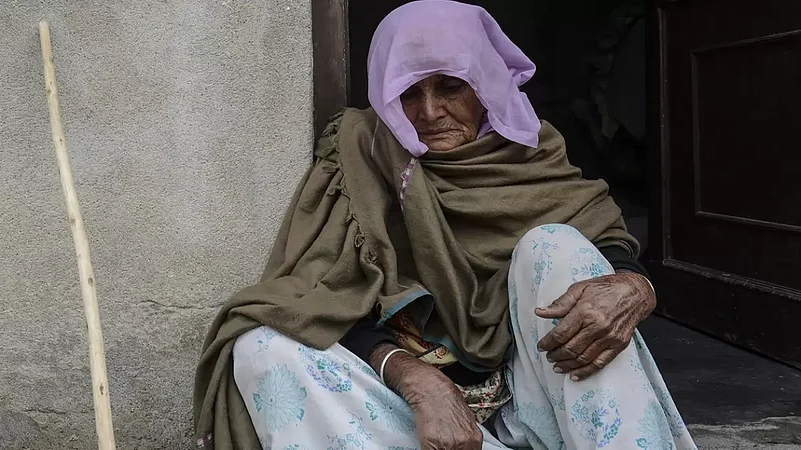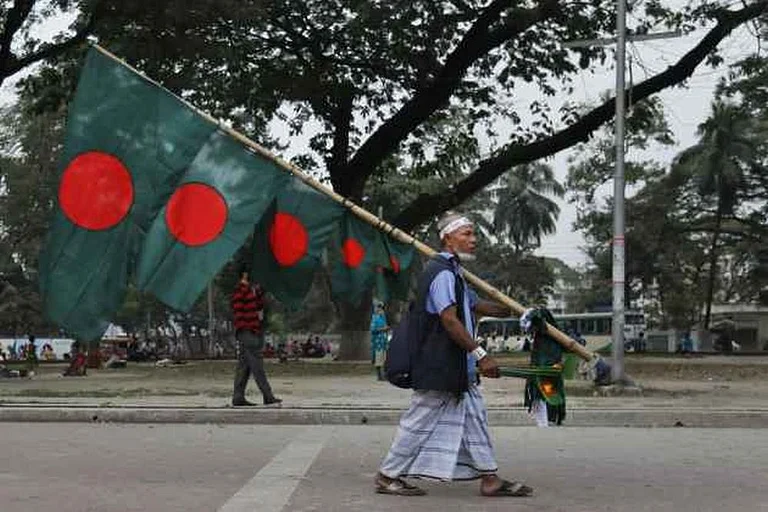An 80-year-old Alamda Bai sits outside a small cottage lined with buckets of water. Frail with silver hair, she sits on the cold floor, insisting that she must show respect. Her cottage is dingy without any windows set in the green fields in the far-off village of Bhimpura in Rajasthan’s Bhilwara district. Lined with buckets and vessels of a week’s water supply, her room has cups and vessels enough for her to eat her meals, but nothing to cook in. This as she lives in isolation, because for 20 years now she has been called a “Dakan” or a witch. Alamda’s husband died 20-odd years ago because of a heart condition, her elder son passed away 3 years ago because of cancer and her other son died in a road accident almost 2 years ago. Bai has been held responsible for the deaths in her family by her own and strangers alike. “Main dakan nahi hoon” I am not a witch, screams Alamda as she breaks down, crying.
Being declared a witch in Rajasthan is almost a “maut ka farmaan” or a declaration of death for a woman says Tara Ahluwalia. Tara an activist, has spent 40 years working with women who become victims of witch-hunting. Witch hunting in the state is aided by the strong impact that the word of mouth has aided with superstition and gender discrimination. Tara says, “The Mewar belt is rife with several social malpractices, this includes the practice of witch hunting. When a woman is declared a witch, her right to life gets snatched away, this often results in harassment, physical violence and social isolation and in many cases even death.”
Like the infamous witch-hunts of the 15th century across Europe, women targeted with the accusations in Rajasthan continue to be on the periphery of the society: the poor, the elderly, or social outcasts in many cases dalit women and those without men in their families have been particularly attacked.
Alamda who lives in isolation away from her family, is served food and water through a string and bucket across a wall st that separates her and her family. Bai’s house is surrounded by sharp, pointed wooden thorns to ensure that no one attacks her home.
Witchcraft, superstition and “Bhopas”
40-year-old Badami Devi was attacked by a mob armed with sticks in her village of Banhera in July 2021. Badami was returning home after walking her cattle. “I was shaken up completely, taken aback before I could even process anything, the women and the men had started attacking me violently, it is honestly a miracle that I made it out alive.”
Badami is one of the several hundred victims who face grave forms of violence as they are labelled as witches. A neighbour of Badami who claimed to have been possessed by an evil spirit, declared that it is in fact Badami who was the evil spirit. As word spread, she was targeted and attacked.
One of the distinctive features that aids witch hunting in Rajasthan remains to be the role of “Bhopas” A Bhopa traditionally a man or a woman were the priest singers of deities in Rajasthan, assuming a key role in the superstitious practices of the state. Tara Ahluwalia says, “Bhopas have been a key ingredient of the toxic cocktail of gendered violence and superstition. Several self-proclaimed Bhopas have taken in younger women claiming to free them and rid them of evil spirts, further assaulting them, inflicting violence on them and their families alike.”
In one of the sting operations conducted by Ahluwalia, she pretended to be a troubled mother-in-law, whose daughter-in-law was processed by an evil spirit. “I saw them hurling one slap after another on her to free her from the spirit. Our operations have ensured that several of these bhopas practising irrational occult are punished and put behind bars.”
After a strong movement to criminalise witch hunting pratices for over 20 years, Rajasthan became the fifth Indian state to enact a law criminalising witch hunting in 2015.
The Act provides for imprisonment for one to five years and a fine of ₹50,000 to anyone who stages such attacks. The act also defines ‘witch-hunting’ as any act or conduct on the part of any person, identifying, accusing or defaming a woman as a witch as well as harassing, harming or injuring such a woman either mentally or physically or by damaging her property.
An important provision of the Witch-Hunting Act is Section 8, empowering the State government to impose a collective fine on the inhabitants of a given area for abetting or participating in witch-hunting or sheltering the perpetrators. The fine is to be used for compensating and rehabilitating the victims. However, no such fine has been imposed so far.
Over 200 cases have been reported across the state since 2015, Bhilwara district in the Mewar belt tops the charts when it comes to instances of brutality and violence inflicted in such cases. According to data compiled by the Rajasthan police, after the law came into effect, 75 cases were registered in Bhilwara district alone.
Activists and lawyers however hold that the majority of the instances do not translate into concrete FIRs.
“In my 37 years, I have dealt with 100 such cases, RTI’s over the data are also currently pending, however, not a single conviction has taken place yet. The process of rehabilitation and social support is present in words but has not yet translated into any action on the ground. Marriages are stalled, education is affected, the cycle of violence, social and economic boycott and generational curse still continues.”
However, many are now breaking free.
Away from the generational curse, breaking free.
24-year-old Parvati Gurjar hailing from Bhilwara’s Saddas works at a car showroom and is studying to secure a government job. “Two years ago, I was called a witch and that changed my life, I lived with my family in our small home. During the rains our area was inundated with mud and dirty water. I was called a witch for simply getting into a quarrel with my neighbour over the filth.”
Parvati’s neighbour threatened her and termed her a witch amid the scuffle. Soon, the word spread. Her family witnessed a complete social boycott. “The world started viewing me differently, it was as if I had horns on my head. I was not able to come out of my house, completely traumatised. People had cut off ties with us, it made me feel extremely embarrassed and guilty.”
Being labelled as a witch also led to her and her sister’s marriage falling apart. Like many young women in Rajasthan, Parvati and her sister Ramgani were married off at an early age; however, they continued to live with their parents, waiting on turning into adults to begin their married lives.
“The in-laws cut all ties with us, they returned our belongings, they came in and made sure that they officially break off the marriages. The word spreading in our small village meant that no one would choose to marry us, anyone from outside coming in to establish a relationship with us is also warned and told off,” says Reena (name changed to protect identity).
Their youngest sister and third-standard student, Aditi (name changed to protect identity), stares outside the main door. “We don’t know if even she will be able to find a life partner, this is now a generational curse,” says Reena.
For their father, a farmer, his daughter’s lives are all over. However, young Parvati is determined to change what is deemed to be “their fate”. My family is making all efforts to ensure that I study I have raised my voice only because I felt like I was empowered and educated. Many pursued me to not fight the case. But I went ahead and filed it. I feel if I have a government job then maybe the world’s view about me will change. I want something to shift, something to change. Even if it's a small job I feel that that is the only way in which I will be able to redeem myself.” she says.























